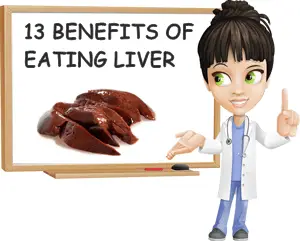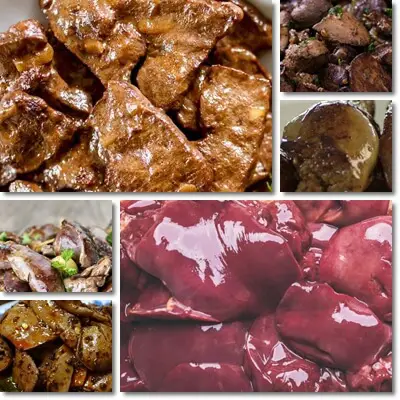Liver is an exceptionally healthy food, nutritionally dense and full of benefits for health. And yet it’s one of the most disliked foods.
While it would seem not even its indisputable benefits for health can make up for its taste and redeem it in the eyes of those who would not even consider it as food, the truth is eating liver might just change your health for the better.
If you can find a way to cook liver so that you can enjoy it enough to introduce it into your diet, even infrequently, know there are many amazing benefits for you to enjoy.
What are the benefits of eating liver?
Is eating liver good for you? How?
1) Liver combats malnutrition
Liver is one of the most nutritious foods in the world. And that’s not an overstatement. Liver as food boasts a dense nutritional profile with a content of vitamins and minerals so high that few other foods come close. Liver is especially high in B vitamins, notably vitamin B12, vitamin B2 and vitamin B3, but also iron, vitamin A and protein which are some of the most common and severe nutritional deficiencies. Liver as a food is optimal for correcting and combating malnutrition.

2) Top anti-anemia food
Liver is naturally extremely high in iron and helps both prevent and correct iron deficiency anemia. Iron is needed to make new red blood cells as well as help red blood cells transport oxygen, boosting vitality and energy levels. Eating liver helps the body get its fill of iron to combat anemia and associated fatigue, malaise and weakness.
How much iron in liver? The average content of iron in liver is 8.99 mg (milligrams) for chicken and turkey liver, 30.5 mg for duck and goose liver, 4.9 mg for beef liver and 23 mg for pork liver (per 100 grams, raw).
How much iron a day? The average adult should get 18 mg (milligrams) of iron a day, every day. Just 100 grams of raw chicken liver provides 50% of daily iron values for an adult, while the same amount of duck or goose liver provides almost 170% of daily iron.
3) Best food source of vitamin B12
Liver is not just one of the best foods to get your vitamin B12 from, but the best! How much vitamin B12 in liver? There are 16.6 mcg (micrograms) of vitamin B12 in 100 grams of raw chicken liver, 54 mcg in 100 grams of duck and goose liver, 19.7 mcg in turkey liver, 59.3 mcg in beef, and 26 mcg in pork.
How much vitamin B12 a day? The average adult should get 2.4 mcg (micrograms) of vitamin B12 a day, every day. A serving of 100 grams of raw chicken liver will get you 691% of all the vitamin B12 you need in a day, while the same amount of beef liver will get you 2470% of your daily vitamin B12 values.
4) Extreme source of vitamin A
Liver is one of the foods highest in vitamin A. How much vitamin A in liver? A serving of 100 grams of raw chicken liver has 3300 mcg (micrograms) of vitamin A, duck liver has 12000 mcg of vitamin A, goose liver has 9310 mcg of the vitamin, turkey has 8060 mcg, beef has 4970 mcg, and pork has 6500 mcg.
How much vitamin A a day? The average adult is advised to get 900 mcg (micrograms) of vitamin A every day. A serving of 100 grams of raw chicken liver provides 366% of total daily vitamin A values for an adult. The same amount of duck liver accounts for 1333% of daily vitamin A, while beef liver for 552% of daily vitamin A requirements.

5) High in preformed vitamin A (retinol)
Not only is liver extremely high in vitamin A, but the vitamin A it contains consists entirely or almost entirely of retinol. Retinol is preformed vitamin A, as opposed to pro-vitamin A (e.g. pigmented carotenoid antioxidants) from plant foods.
Compared to provitamin A from plant foods which needs to be converted into the actual vitamin following absorption, preformed vitamin A or retinol from liver does not need to be converted. Not just this, but it has both a higher absorption rate and a higher retention rate, being significantly more bioavailable and thus a better form of vitamin A.
6) Good for high cholesterol
Eating liver can help lower bad LDL (low density lipoprotein) cholesterol and also raise good HDL (high density lipoprotein) cholesterol. The cholesterol lowering properties of liver are owed to a high content of vitamin B3 which studies show both holds benefits for high cholesterol and helps improve cholesterol profile (LDL vs HDL).
The average adult requires 16 mg (milligrams) of vitamin B3 per day. A serving of 100 grams of raw chicken liver, the most accessible of the different types of liver, provides 9.7 mg of niacin which accounts for 60% of daily vitamin B3 values for the average adult. Not just this, but liver is also fairly low in calories and has a modest content of fat which is further good for high cholesterol so long as it’s consumed reasonably.
7) Good food to eat during pregnancy
Liver is one of the best foods to eat in pregnancy. One especially important benefit of eating liver during pregnancy is it helps the baby develop normally. More specifically, liver contributes to the normal development of the brain, spine and spinal cord of the baby in the womb thanks to its generous content of vitamin B9.
How much vitamin B9 in liver? Chicken liver has 588 mcg (micrograms) of vitamin B9 (folate) per 100 grams. The average adult is advised to get 400 mcg of the vitamin a day. This means that a serving of 100 grams of chicken liver provides 147% of daily values for the vitamin.
Studies confirm getting enough vitamin B9 in the diet, whether from foods such as liver or via dietary supplements, helps pregnant women measurably reduce their babies’ risks of neural tube defects which are defects of the brain, spine and spinal cord. Not just this, but the generous content of vitamin B9 in liver is also a source of benefits for the pregnant woman, boosting energy levels and vitality and reducing tiredness in pregnancy.
8) Suitable for a keto diet
A keto diet or ketogenic diet is a diet that is low in carbohydrates and high in protein and/or fat. Liver is actually a good food to eat in a keto diet. A serving of 100 grams of raw chicken liver has less than 0.8 grams of carbohydrates, but close to 17 grams of protein and under 5 grams of fat. Whether you are high protein-low fat keto or high protein-high fat keto, liver can represent a good option for a keto meal in both instances.
9) Helps with muscle gain
Liver is a food naturally high in protein. How much protein in liver? A serving of 100 grams of raw liver provides, on average, between 16 and 21 grams of protein with poultry liver being lower in protein and pork highest.
Due to its high protein content, liver makes a good to eat after a workout to help with muscle gain. Protein in liver helps repair muscle fibers damaged via exercise and build new muscle, supporting muscle gain and muscle function. However, do avoid it pre-workout because it causes acid reflux and can undermine your exercise routine as a result.
10) Good for losing weight
What makes liver good for losing weight is the fact that it’s not very high in calories: a serving of 100 grams of raw liver has about the same number of calories as chicken breast. This means that you can introduce liver into your weight loss diet for added nutrition and variety, without risking weight gain.
At the same time, liver has a great content of protein to help with lean mass acquisition and boost metabolism. Eating higher protein helps with muscle gain which, in turn, burns more calories and supports the weight loss efforts.
Not just this, but liver is low-carb, high-protein which makes it a satiating food with benefits for blood sugar control – it helps curb cravings and prevent binge eating to help you lose weight sustainably.
11) Eating liver preserves good vision
One of the most surprising benefits of eating liver has to be its benefits for eyesight. Liver is good for eyesight for two reasons: one, it’s high in vitamin A, and two, it’s high in vitamin B2. Vitamin A exerts important antioxidant activities at the level of the retina, protecting against damage from sunlight which causes loss of visual acuity.
Vitamin B2 is needed for cornea heath and for metabolizing preformed vitamin A, retinol, into retinoic acid, a specific vitamin A metabolite needed to perform various vitamin A function in the body.
12) Lower risks of stroke and cancer if you eat liver
Despite meat, and red meat in particular, including organ meat, being associated with higher risks of cancer and cardiovascular disease, limited intakes in fact exert protective effects against both cancer and cardiovascular disease.
For one, liver is an exceptionally nutritious food. Its content of B vitamins in particular, notably vitamins B3, B6 and B12, and also potassium, is a source of benefits for the heart and cardiovascular system specifically. Liver is good for high cholesterol and high blood pressure, and actively support the heart muscle function and health, lowering risk factors for cardiovascular disease and cardiovascular events such as heart attack and stroke.
Liver is also naturally extremely high in vitamin A which has scientifically proven immunomodulating activities and antioxidant effects, important for supporting the immune system function and scavenging free radicals, and initiating reparative processes to combat oxidative damage. A deficiency leading to immune system depression increases risks of various cancers.
13) Counteracts skin damage and inflammation
Vitamin A in liver is directly involved in skin cell renewal and skin cell differentiation and exerts antioxidant and antiaging effects. Vitamin A acts as an antioxidant, scavenging free radicals, and combats associated cell damage, initiating reparative processes conducive to a healthier, more youthful skin.
Vitamin B9 in liver also helps with cell division, while vitamin B12 helps with DNA repair. Vitamin B3 is effective against dermatitis, skin thickening, skin inflammation and hyperpigmentation due to sun damage. Vitamin B2 also contributes to skin health, preventing rashes and inflammation of the skin.
